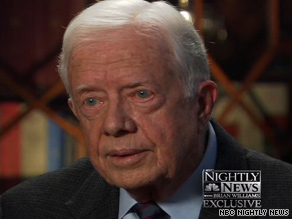
Everyone was thinking exactly this. I've said it repeatedly. It took an old white man to say it for anyone to take any notice. It's very very true.
WP:
What I wrote last year about candidate Barack Obama -- that to win he had to be seen as "the least-aggrieved black man in America" -- may be even more relevant now. To lead this diverse and fractious nation effectively, the president has to negotiate racial issues with delicacy, caution and tact. He has to give even his most vocal critics the benefit of the doubt.
But I don't. So I can say in plain language that Jimmy Carter was right in essence, but wrong in degree. It seems clear to me that some -- but not "an overwhelming portion," as Carter claimed -- of the "intensely demonstrated animosity" toward Obama is indeed "based on the fact that he is a black man."
Obama disagrees. "The president does not believe that criticism comes based on the color of his skin," White House press secretary Robert Gibbs said Wednesday. Obama is the most garrulous president in many years, but when a reporter asked him about Carter's remarks, he had not a word to say.
Nor do many other leading Democrats -- outside of the Congressional Black Caucus -- want to touch this explosive subject. As a matter of political strategy, I don't blame them. The minute you observe that some of Obama's critics seem to be motivated by race, the critics howl that they're all being smeared as "racists" simply because they disagree with Obama's policies. This is not true.
Of course it's possible to reject Obama's policies and philosophy without being racist. But there's a particularly nasty edge to the most vitriolic attacks -- a rejection not of Obama's programs but of his legitimacy as president. This denial of legitimacy is more pernicious than the abuse heaped upon George W. Bush by his critics (including me), and I can't find any explanation for it other than race.
I'm not talking about the majority of the citizens who went to town hall meetings to criticize Obama's plans for health-care reform or the majority of the "tea bag" demonstrators who complain that Obama is ushering in an era of big government. Those are, of course, legitimate points of view. Protest is part of our system. It's as American as apple pie.
I'm talking about the crazy "birthers." I'm talking about the nitwits who arrive at protest rallies bearing racially offensive caricatures -- Obama as a witch doctor, for example. I'm talking about the idiots who toss around words like "socialism" to make Obama seem alien and even dangerous -- who deny the fact that he, too, is as American as apple pie.
This whole discussion was kicked off by Rep. Joe Wilson's "You lie!" outburst during Obama's address to a joint session of Congress. As the House members who voted to rebuke Wilson -- including seven fellow Republicans -- understand, calling the head of state a liar in such an official setting is way out of bounds. Grumbling and even booing come with the territory, but a flat accusation of mendacity is an impermissible sign of disrespect. Nobody ever called Bush a liar when he was speaking in the House chamber.
Why would Wilson think he was entitled to insult the president this way? Why would he refuse to offer a formal apology on the House floor, which would have ended the matter? I have no idea. Friends and colleagues say he is no racist, and they know the man a lot better than I do. But he does have a history.
Before he was elected to Congress, Wilson was one of a handful of South Carolina state senators to vote to keep the Confederate flag flying above the State House in Columbia. This was after a long, bitter battle over the flag had distilled the issue, at least in the minds of most South Carolinians, into a proxy fight over race: Was the state going to move forward, or would it cling to its shameful past? Most politicians in the state, including most conservatives, had decided it was time to move on. Wilson was one of the last diehards.
That, of course, was his right. But now that he has committed a singular act of disrespect toward the first African American president, it's my right to ask whether his motivation was racial.
I look forward to the day when we can look past race. But before we can do so, we need to look at race and see it clearly. Jimmy Carter did us a favor.
No comments:
Post a Comment